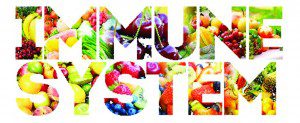 Keeping the immune system strong and healthy plays a vital role in preventing illnesses such as a cold or the flu virus. In order to maintain a healthy immune system, the body needs the following: adequate sleep, regular exercise, proper diet and supplements.
Keeping the immune system strong and healthy plays a vital role in preventing illnesses such as a cold or the flu virus. In order to maintain a healthy immune system, the body needs the following: adequate sleep, regular exercise, proper diet and supplements.
The general recommendation for adequate sleep is between seven to eight hours each night. Lack of sleep and/or excessive sleep has been linked to weight gain and other health problems.
Exercise is also key to maintaining a strong immune system. Even moderate exercise can help boost the immune system. Try to sustain an elevated heart rate for at least twenty minutes, three times a week.
Let your diet work for you to help strengthen your immune system.
A proper diet, full of vitamin and mineral-rich foods also plays a vital role in boosting the immune system. Avoid processed foods—foods with three or more ingredients you cannot pronounce are usually not good options. Maintain a “colorful” diet, with lots of greens. Foods known to help boost the immune system include yogurt, almonds, berries, cabbage, mushrooms, grapefruits, spinach, garlic and tea.
Supplements can boost your immunity, especially during the coming months.
If you suspect your diet is not providing you with all your micronutrient needs — maybe you don’t like vegetables or you choose white bread over whole grains — taking a daily multivitamin and mineral supplement brings health benefits of many types, beyond any possibly beneficial effects on the immune system. Taking megadoses of a single vitamin does not. More is not necessarily better.
Selenium. Some studies have suggested that people with low selenium levels are at greater risk of bladder, breast, colon, rectum, lung, and prostate cancers. A large-scale, multiyear study is currently in progress to look at the effects of combining selenium and vitamin E on prostate cancer prevention.
Vitamin A. Experts have long known that vitamin A deficiency is associated with impaired immunity and increased risk of infectious disease.
Vitamin B2. There is some evidence that vitamin B2 enhances resistance to bacterial infections in mice, but what that means in terms of enhancing immune response is unclear.
Vitamin B6. Several studies have suggested that a vitamin B6 deficiency can depress aspects of the immune response, such as lymphocytes’ ability to mature and spin off into various types of T and B cells. Supplementing with moderate doses to address the deficiency restores immune function.
Vitamin C. The jury is still out on vitamin C and the immune system. Many studies have looked at vitamin C in general; unfortunately, many of them were not well designed. Vitamin C may work in concert with other micronutrients rather than providing benefits alone.
Vitamin D. For many years doctors have known that people afflicted with tuberculosis responded well to sunlight. An explanation may now be at hand. Researchers have found that vitamin D, which is produced by the skin when exposed to sunlight, signals an antimicrobial response to the bacterium responsible for tuberculosis, Mycobacterium tuberculosis. Whether vitamin D has similar ability to fight off other diseases and whether taking vitamin D in supplement form is beneficial are questions that need to be resolved with further study.
Vitamin E. A study involving healthy subjects over age 65 has shown that increasing the daily dose of vitamin E from the recommended dietary allowance (RDA) of 30 mg to 200 mg increased antibody responses to hepatitis B and tetanus after vaccination. But these increased responses didn’t happen following administration of diphtheria and pneumococcal vaccines.
Zinc. Zinc is a trace element essential for cells of the immune system, and zinc deficiency affects the ability of T cells and other immune cells to function as they should. Caution: While it’s important to have sufficient zinc in your diet (15–25 mg per day), too much zinc can inhibit the function of the immune system.
Herbs and other supplements
Everyone’s immune system is unique. Each person’s physiology responds to active substances differently. Understanding that proper diet, exercise and sleep routines to maintain a strong immune system and good health can be overwhelming.
If you have any questions about healthy food choices or dietary supplements, the friendly staff at Ada’s Market can help you choose the best options for optimal health.
Ada’s Market
7070 College Pkwy, Fort Myers, FL 33907
(239) 939-9600 ~ adasmarket.com










